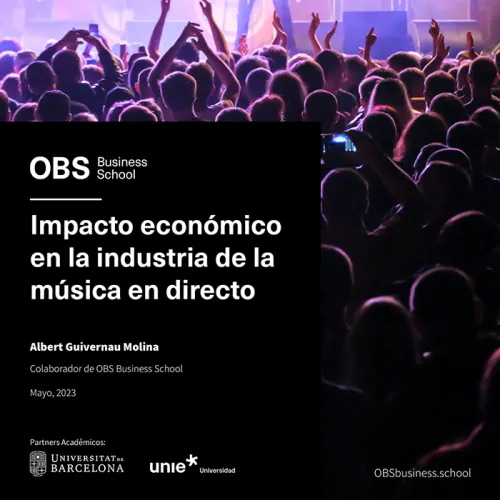
OBS Report: Economic Impact on the Live Music Industry 2023
Live music festivals have become the driving force behind the cultural industry
- The live music industry turned over almost 460 million last year in Spain, a new record even above the 2019 figures (191% more than in 2021 and 20% above the 2019 figure).
- Today, music festivals are the main source of income for many artists.
- In 2023, promoters hope to recover the investments lost in recent years, although it does not seem that the turnover will exceed that of 2022.
- They are calling for more aid from the different administrations, as well as clearer criteria so as not to find so many differences between local and regional administrations.
OBS Business School has published the report Economic impact on the live music industry, directed by professor and collaborator of the school Albert Guivernau. The report analyses the state and evolution of the festival industry in 2022 and the forecasts for 2023, the year in which supply and demand are expected to come into line. After two years of cancellations, losses in the millions and restricted celebrations, festivals this year are looking for total stability and a return to pre-pandemic figures. However, although 2023 is seen as the definitive year to recover lost investments and to be able to pay back the mortgages and loans that many promoters have had to take out to survive, it is possible that growth this year will not be as high as in 2022, when the general public was eager to return to normality in terms of live music.
Live music festivals have become a real driving force in Spain's cultural industry and are now the main source of income for many artists. More and more Spanish cities are hosting these events, but those held in Barcelona, Madrid, Zaragoza and Valencia stand out in particular, bringing together great artists, groups and figures from the music scene at festivals such as Primavera Sound, Mad Cool Fest and Noches del Botánico.
Main conflicts of festivals in the post-pandemic era
Many festivals have managed to survive the difficult years and some have even managed to improve and reach historic attendance records. However, the oversupply of events that exists today, which translates into difficulty in finding free dates, coupled with price increases that limit the purchasing power of attendees, has led some promoters to cancel without a new return date.
Those that have remained standing continue to show some inefficiencies that become the most common criticisms from participants, such as long queues for the purchase of drinks, poor management of toilets, the cancellation of artists announced on the bill or even the cancellation of entire festivals, without taking into account the costs borne by the attendees, such as train or plane tickets and accommodation. "Every time this happens, the public loses connection with live music and the sector as a whole suffers", the report says. The fact is that the public demands a more solid model that prevents these changes that always harm the fans, for whom it matters little whether it is the fault of one or the other. Albert Guivernau comments: "If so many promoters break the rules, it will be necessary to explain them better or modify them, or stop giving spaces to those who break the rules again. What is clear is that something has to change."
For their part, the music producers are calling for more aid from the different administrations and clearer criteria so as not to find so many differences between local and regional administrations, as happened in the attempted cancellation of the Barcelona Beach Festival.
These were the figures for 2022
The live music industry had a turnover of almost 460 million last year in Spain, a new record even above the 2019 figures (191% more than in 2021 and 20% above the 2019 figure). This indicates an acceleration of the sector and a convergence with our neighbouring countries. Madrid contributed 22% of this revenue from ticket sales, Catalonia 21% and Andalusia 16%. The festival with the highest attendance was Primavera Sound with half a million people, followed by Mad Cool in Madrid (310,000) and Arenal Sound in Burriana (300,000). After them, Viña Rock in Villarrobledo (240,000), Rototom Sunsplash (211,000) and FIB (180,000), both in Benicàssim, Resurrection Fest in Viveiro (145,000), Weekend Beach Festival in Torre del Mar (135,000), Sónar in Barcelona (122,664) and, finally, O Son Do Camiño in Santiago de Compostela with 115,419 attendees. The most attended cycle was Marenostrum in Fuengirola (188,000 people), followed by Noches del Botánico in Madrid (122,858) and Noches del Malecón in Murcia (119,283), as well as Icónica Sevilla Fest (84,711) and Jardins de Pedralbes in Barcelona (75,316).
Fito & Fitipaldis were the most popular national artists (almost 330,000 people attended their 27 concerts, with 13 ‘sold outs’), followed by Alejandro Sanz and Manuel Carrasco. Among the international artists who performed in Spain, Marc Anthony was the most popular, followed by Red Hot Chili Peppers and The Rolling Stones (it should be noted that this legendary group only played one concert).
The festivals of 2023
This year's offer is once again wide-ranging and spread throughout Spain. We will have to wait and see whether the current economic circumstances, with the generalised price increase, takes its toll on this sector or whether fans remain loyal to their idols and attend the events as they did last year.
- Mallorca Live Festival. From 18 to 20 May it will bring together Vetusta Morla, Bad Gyal, Black Eyed Peas, Quevedo, The Chemical Brothers, Bomba Estéreo and Viva Suecia, among others.
- Interestelar Sevilla. On 19 and 20 May. Ladilla Rusa, Niña Polaca, Sidonie, Vetusta Morla and Viva Suecia will perform.
- Spring Festival (Alicante). On 26 and 27 May. It will bring together Leiva, Lori Meyers, Carlos Sadness and Alizzz.
- Primavera Sound (Barcelona and Madrid). From 1 to 3 June in Barcelona and from 8 to 10 June in Madrid. Rosalía, Depeche Mode, Halsey, Calvin Harris, Tokischa and Måneskin, among others, will be performing at this year's festival.
- Festival de les Arts (Valencia). On 9 and 10 June. Amaia, Sidonie and Vetusta Morla, among others, will be there.
- Sónar Barcelona. Between 15 and 17 June. This edition will feature, among others, Aphex Twin, HOLO by Eric Prydz and Bad Gyal.
- O son do Camiño (Santiago de Compostela). From 15 to 17 June. Some of the guest artists are Bizarrap, Leiva, Maluma, Aitana and Vetusta Morla.
- Azkena Rock Festival (Vitoria-Gasteiz). From 15 to 17 June with Iggy Pop, Rancid and Lucinda Williams.
- Vida Festival (Vilanova i la Geltrú). From 29 June to 1 July with Julieta Venegas, La Casa Azul, Jorge Drexler and Lori Meyers.
- Les Nits de Barcelona. This is the new festival that will take place this summer at the Palau de Pedralbes from 27 June to 26 July and will host 30 concerts by artists such as Sebastián Yatra, Natalia Lafourcade, Antonio Orozco, Tom Odell and David Bisbal.
- Cruïlla Barcelona. From 5 to 8 July with Leiva, Placebo, Franz Ferdinand, Viva Suecia and Stay Homas.
- Mad Cool (Madrid). From 6 to 8 July. With Robbie Williams, Lizzo, Lil Las X, Sam Smith, The Black Keys, Red Hot Chili Peppers and The Prodigy.
- Bilbao BBK Live (Bilbao). From 6 to 8 July. Artic Monkeys, Jamie XX, The Blaze, M83, Phoenix and Florence + The machine.
- PortAmerica (Caldas de Reis, Galicia). From 13 to 15 July with Bad Gyal, Carlangas, Molotov and Jorge Drexler among others.
- FIB (Benicásim). From 13 to 16 July. It will feature Bastille, Crystal Fighters, Amaia, La Casa Azul and Clean Bandit.
- Festival Sónica (Castro - Urdiales). Between 14 and 15 July with Siloé, Marlon, Ginebras and Leiva.
- Low Festival (Benidorm). From 28th to 30th July. Viva Suecia, Placebo and Vetusta Morla will be there.
- Sonorama Ribera (Aranda de Duero). From 9 to 13 August. With Amaral, Carlos Sadness, Delafé y las Flores azules, Jorge Drexler, Marlon and Viva Suecia.
- Mijas Cove. Between 31 August and 2 September. With The Blaze, Foals, The Strokes, Arcade Fire, Florence + The Machine, Metronomy and Amaia.
Written by:
Carmen García-Trevijano
OBS Business School Press Office
